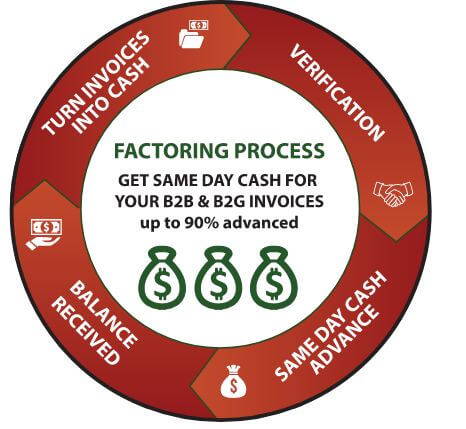Invoice Factoring is a financial transaction and a type of debtor finance. In an invoice factoring, a business sells its accounts receivable (invoice) to a third party (called a factor) at a discount. A company will sometimes factor its receivable assets to meet its present and immediate cash needs. It might also factor their invoices to mitigate credit risk.
Factoring is commonly referred to as accounts receivable factoring, invoice factoring, and sometimes erroneously accounts receivable financing. Accounts receivable financing is a term more accurately used to describe a form of asset-based lending (ABL) utilizing a company’s accounts receivable as collateral.
How Does Invoice Factoring Work?
First: Your company provides goods or services to creditworthy customers and submit correct invoices.
Second: Your company sells it’s unpaid invoices to an invoice factoring company.
Third: A factoring company verifies the invoices and then funds your business with an immediate payment of up to 90% of the received amount the same day.
Fourth: Customers make payment directly to the factoring company according to the terms of the invoice. The factoring company then returns the balance of the paid invoice minus a fee.
How is Invoice Factoring Different from a Bank Loan?
Factoring differs from borrowing in companies sell accounts receivables rather than merely serve as collateral. The net result is that your company can convert its receivables into immediate operating cash. That way, you will not have to wait 30, 60, 90 days or more for your customers to pay.
This process places the time, cost, and effort of the collection into the hands of the factoring company, allowing you the time to concentrate on what you do best – run your company. Your business receives the cash it needs when it needs it, so you can best manage your business.
Invoice factoring can be an excellent option for companies that need money quickly, but who aren’t able to secure a conventional, bank loan. Many refer to business factoring by several names such as receivables factoring, invoice discounting, invoice factoring, and debtor financing.
Good factoring companies will research the credit history of the seller’s customers before purchasing the invoices. Factors will want to be confident that these companies have a history of paying their bills. The factors will also provide non-recourse factoring. Non-recourse protects your company in the case of your client going insolvent during the transaction period.
Factoring is a way for companies to infuse cash into their business without taking on additional debt. By selling their accounts receivables at a discount, they can get money right away without having to wait to collect it themselves. Receivable finance is a great funding option for most industries, including trucking, staffing, distributors, and importers.
